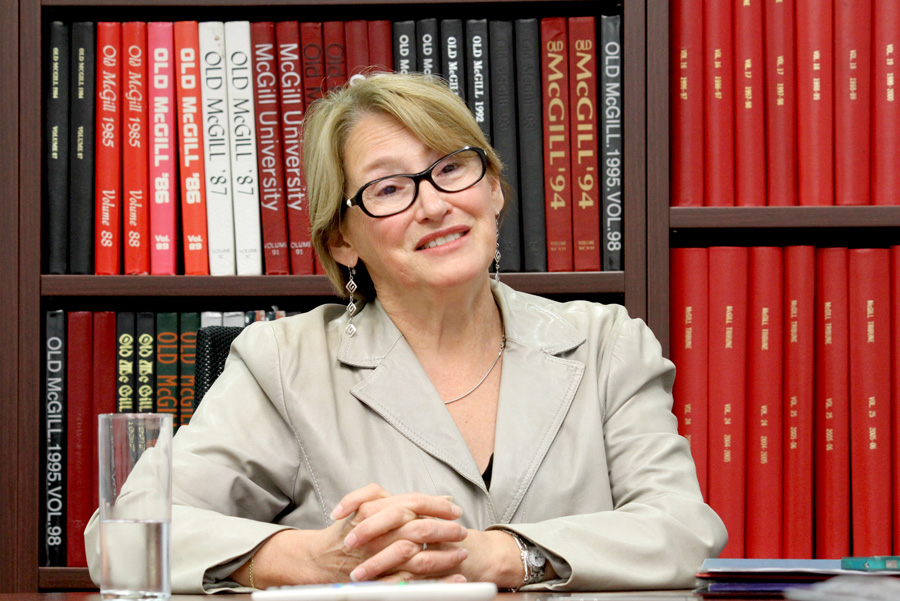Dr. Suzanne Fortier became McGill’s 17th principal and the second woman to hold the position on Sept. 5, when she started her five-year term. In an interview with the Tribune on Wednesday, Fortier discussed her approach to research, the value of a degree from McGill, and how being a McGill alum has influenced her life.
McGill Tribune: You have been principal for nearly a week now—what aspects have you found most challenging? The most enjoyable?
Suzanne Fortier: The most enjoyable is to see the life on the campus, the students returning, ‘le feu de la rentree,’ I call it. Everyone here has such a strong commitment to students, and of course we’ve been through a difficult period in the recent months, having to take some [budget] cuts, and that’s the most challenging because people don’t want to see any diminishing of the quality of the environment for students.
MT: You have said in the past that you specialize in building business-academic relationships. What is your approach to funding basic and applied research at McGill?
SF: It is absolutely crucial to support basic research. It’s what we often call curiosity-driven research; it’s research done simply because we want to advance our knowledge. At the same time, we live in a society and an economy that is increasingly knowledge-based. Those who are at the centre of the learning and the advancement of knowledge need to share that knowledge with whoever it is that can take advantage of the knowledge for the benefit of society. We set up all these dichotomies, and these don’t work very well in the 21st century. The only difference [between basic and applied research] is that applied research is purpose-driven research. Then everything we do, for instance in environmental research, could be viewed as purpose-driven and therefore applied. The important thing for me has always been that whatever we do, we must meet very high standards of quality.
MT: In the QS ranking released yesterday, McGill’s position has fallen. Do you have plans to address any shortcomings that caused this slip?
SF: Does a move from 18 to 21 matter? I don’t think it is a significant drop. However, we must watch to see whether this is a trend or a blip. And more importantly, we must look carefully at the data these rankings will provide us, and take advantage of these to see where we can put our efforts, particularly where it aligns with the goals of our university.
MT: What do you think a degree from McGill is worth now?
SF: A degree from McGill right now is worth a lot, because the reputation of McGill worldwide is strong. It’s strong because of the many, many people before us who have built the reputation of this university, and I’m certainly going to work to make sure it continues to be worth as much as it is now. I’ve been amazed throughout my life as to the visibility of McGill and what it’s worth. When I left McGill, I went on to work with a person who I thought was the best in his field. I was shy and thought, how am I going to approach this person to ask him if I can come do post-doctoral work with him? But just saying McGill was enough. If you continue to try to do your best, that combined with a McGill degree is pretty important – it opens doors [and] it makes people pay attention. Everywhere you go, people recognize McGill.
MT: How will being a McGill alum affect your performance as principal?
SF: I’ve drawn from my experience in terms of the things I want us to preserve and that I want us to build on. I was impressed as a student by the degree of attention I got from my professors. I was not a number – I was an individual and they paid attention and they nurtured my interest in learning. One thing I had not expected coming to McGill – because I was pretty ignorant, there was no one who went to university before me in my family – was that I’d be surrounded by the best people in their field in the world. It’s inspiring. You’re a young person, you know very little about this world, and these giants – people whose names you read in your textbooks – being there and talking to you. They were people who allowed me to think I could do that, too.
MT: The Quebec Charter is attempting to impose religious dress code regulations on government employees, but universities can choose to opt out. Will McGill choose to opt out of these requirements?
SF: One of my personal values is that it is important, when you are part of a community, to allow that community to express itself, particularly when it comes to values and principles. It is difficult for me, having this value myself, to declare, 5 days into the job, what this university will do. However, I know the university has done quite a bit of work in the past on diversity and inclusiveness, and that’s what we need to refer to as a community.
MT: What are the most important issues you see at McGill that require your attention first?
SF: I’m still learning, and I’m still looking at what we need to do. Biggest issues? One is that I’m keenly aware of the importance of human talent. That means we must try to offer people opportunities for doing their best, for developing their potential. The challenge for all universities around the world is to think about what it means to be a learning community in this century, how can we do it best. That’s to me the biggest challenge of all universities, because it’s a transformation that we have to be looking at.
—This interview has been conducted, condensed, and edited by Emma Windfeld.








